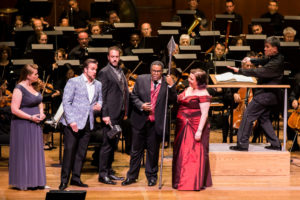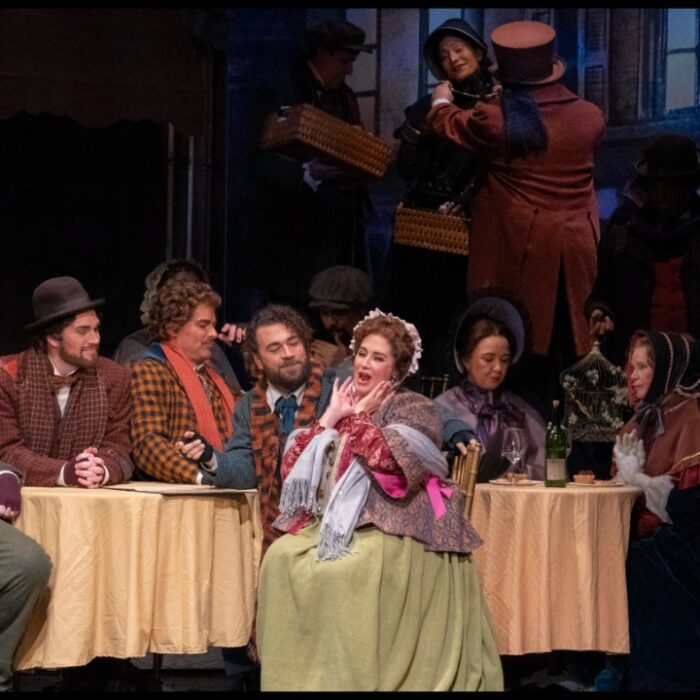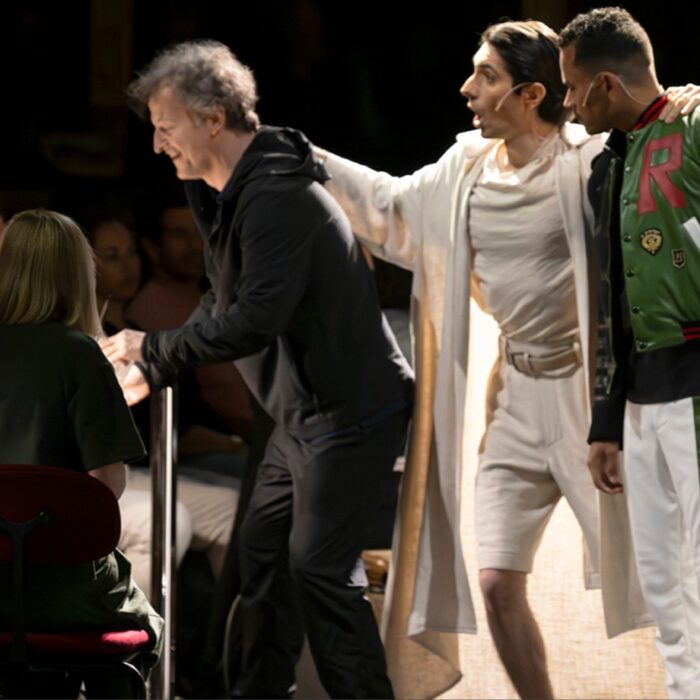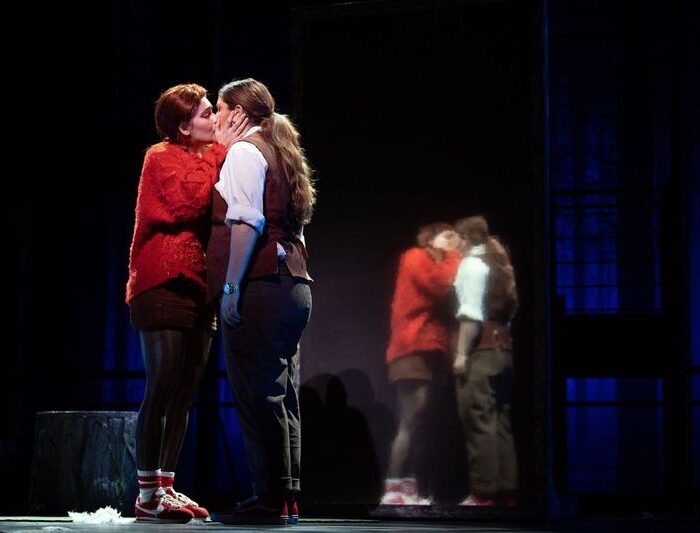
New York Philharmonic 2016-17 Review: Alan Gilbert Says Goodbye With a Monumental ‘Das Rheingold’
By Francisco SalazarAlan Gilbert is saying goodbye to the New York Philharmonic as music director. It ends a tenure that brought significant new works and experimented with the standard repertoire alongside one of the finest orchestras in the world.
But Gilbert has made sure to make opera a mainstay for the New York Philharmonic so it is no surprise that he ends his tenure with Wagner’s “Das Rheingold,” the first of the composer’s masterpiece “The Ring Cycle.” And in this set of performances, he has brought a magnificent young cast that should surely be on Metropolitan Opera’s radar for its next staging of the Ring Cycle in 2019.
The Orchestra
Since Gilbert has been leading the Philharmonic, there has been a sense of rejuvenation as the orchestra is now playing with more energy and force than audiences had seen in years and that was demonstrated on the final performance of “Das Rhiengold.”
As Gilbert conducted the first notes of the score, he began with a piano sound that was held for a moment before he began building it with the addition of more instruments. The tempo was slow but filled the hall with energy, creating the image of waves steadily growing. As the orchestra continued to build so did the dynamics and the tempo, creating the sense of swifter waves washing onto the audience. It all exploded into the Rheinmaidens’ song. Here Gilbert really created that sunrise that Wagner so beautifully painted in his orchestrations.
Another highlight of the orchestra was, of course, the descent into Nibelheim. The orchestra roaring with rhythmic precision emphasizing each accent in the score and the bells, creating a demonic color.
And the grandiose finale that sees the gods ascending to Valhalla was a spectacle as the orchestral harps gave off a celestial feel that led the way to the triumphant strings and brass at the end, everything crescendoing into a cathartic final note. It was breathtaking musicianship that truly evoked all the colors that Wagner wanted for his music.
It is also important to note that Gilbert was very much with his singers, never covering them with the orchestra and some of the highlights included Flosshilde’s seductive music that was accompanied by the transfixing harp and Loge’s fire theme. Each time it appeared and accompanied Russell Thomas, Gilbert followed Thomas’ characterization from mocking to more serious tones. One sensed Loge’s arc through the piece through Gilbert’s acute orchestral coloring.
The Nibelungs
When Christopher Purves as Alberich first entered the stage he was awkward. His walk almost seemed to have a hunchback quality and his vocal quality was more disconnected. It suited the characterization to perfection. One almost felt sympathy as the Rhinemaidens danced around him and eventually threw him to the ground. However, things changed and Purves’ voice obtained a ringing power. This, of course, happened when his character stole the Ring. In his brief scene with Mime, the awkward walk was gone and he towered over Mime. This was no longer a character subjected to anyone. That was made clear with his voice as it blazed through the hall. Even in his extended scene with Wotan, when he was tied up and subjected to give up the ring, Purves’ voice blasted with authority. It was not a character that had just been mocked and humiliated at the start of the work. This Alberich was being despondent and aggressive. His emphasis on the text was even more impressive as he snarled at Wotan warning him of his fate.
Meanwhile, Peter Bronder’s Mime was the comic character. The ugliness of the character came as Bronder used his voice never trying to make a beautiful sound but instead using the timbre to create an uncomfortable quality that created a comic element. Like Purves’ Alberich, this Mime walked with an awkward limp that also emphasized the ugliness of the character.
Wotan and Loge
Eric Owens had a huge breakout when he portrayed Alberich at the Metropolitan Opera and it was no doubt that he would eventually move to Wotan. And the results were wonderful. If his voice is sometimes overpowered by the orchestra, Owens’ characterizations are always great to see. One immediately sensed that this was a wearied and vulnerable Wotan. He came on stage almost in a daydream and it took Fricka’s outbursts to wake him from it. And even in his scenes with Alberich, Owens didn’t seem to be the one in command. Even at the end of the of the opera, as the gods ascend to Valhalla, this Wotan seemed to have trepidation, almost as if he has been worn out by all the events that have happened. One intuited that he could foresee that no good will come of it. That was also represented in his voice as it always remained in the mezzo forte range. Unlike some Wotans who can sometimes be vigorous with the text, he was more restrained.
On the other hand, Russell Thomas’ Loge was the opposite. This was a sarcastic, comic and bold Loge. From his entrance, Thomas was playful, walking around the stage singing with a suave tone. As he was describing Alberich’s story, Thomas looked toward the audience and his castmates almost interacting with all his surroundings. The switch in dynamics from piano to mezzo forte to forte transported the viewer to each scene he described and what was even more impressive was how he sang this. Wagner wanted Bel Canto style in his singing and Thomas delivered it. The tenor approached each phrase with ease never seeming to lose power or agility. And when he was ready to use his upper register, the voice gleamed.
The Giants
If there is one thing that describes the giants it is lust, corruption, and ambition. Morris Robinson’s Fasolt entered the stage with an authority and a booming voice that immediately demanded Freia. And he didn’t stand down throughout the opera. When he heard of the Ring, Robinson’s look immediately showcased that desire and his voice also started to increase in power.
Stephen Milling was no different. While Fasolt has the first phrases of the opera, Milling’s Fafner stood listening intently. One immediately sensed that this giant was one to keep an eye on. Once he began singing, that authority immediately came through. It was quite probably the biggest voice in the massive cast and he was able to really instill fear. The fact that he stood separately from Robinson’s Fasolt also immediately foreshadowing that he was only looking out for himself.
The Gods
From the moment Jamie Barton entered the scene, one knew this was no damsel-in-distress. Barton’s Fricka was a strong woman who use her anger and seductive powers to obtain what she wanted from her husband. When she first entered, Barton’s Fricka had a worried yet angry look that transmitted through her voice. Her phrasing was more choppy than legato, emphasizing that feeling. And then came to some outbursts really emphasizing the anger for Wotan giving Freia away. These emphasized the enormous power of her voice. But then at one crucial moment when Loge tells Wotan of Alberich, Barton went over to her Wotan and caressed him. Vocally she used her voluptuous middle range to seduce him into finding the ring all while smiling at him. Of co, rse it didn’t hurt that Barton chose a burgundy colored gown that could easily match the many colors and emotions of her character.
As Froh Brian Jagde sang with passionate ardor from his opening lines when he tries to save Freia to his final lines. However in his final solo Jagde began with a piano line before crescendoing to the heroic tenor tone. Christian Van Horn once again proved why is a promising bass and is well on his way to stardom. The bass is hard to miss as he is tall and an incredible actor. But it is his vocal quality that really makes an impression. His final solo was sung with a connected legato line one hardly hears in Wagner and it was a pleasure to hear it performed with so much finesse and refinement.
Rachel Willis-Sorensen conveyed Freia as a distressed woman. From the moment she walked on stage there was a sense of fright and it was seen through her body movements as she pleaded with Wotan and went to Fricka for consolation. Her voice easily brought those emotions to the fore as she let out all her power, particularly in her high notes. These easily reminded the listener of a cry for help.
Kelley O’Connor’s brief appearance as Erda was something of a miracle. A natural stage presence, she walked on stage and all eyes were on her as she warned Wotan of the ring’s danger. O’Connor’s instrument is immense and imposing and she sang with a dark tone. O’Connor lengthened the line holding each note and emphasizing the text. It almost felt like there was no need to read the subtitles because her timbre expressed the foreboding destruction.
As Flosshilde Tamara Mumford exuded sensuality as she flirted with Purves’ Alberich. She danced around him putting her hands on his chest and using her corporal movements to impress. Her voice employed a beautiful legato line that she is so well known for, soaring through the gorgeous melodic line. And when she had Alberich convinced Mumford kicked him to the ground.
Jennifer Johnson Cano once again showcased why she is an artist to behold. As Wellgunde she showcased youth and delight as she ran on stage dancing and singing through her opening lines. But it was her creamy mezzo that really seduced, cutting through the orchestra and creating a true bel canto line.
Jennifer Zetlan’s Woglinde had a bright timbre that displayed beautiful high notes and, together with her two Rheinmaidens, expressed a sense of youth and playfulness. Her voice easily meshed with Mumford and Cano.
The three also played around the stage twirling around and using glitter for the Rheingold. It wasn’t the most inventive of stagings but these three really created an environment out of nothing and that is something even some expensive productions have a hard time doing with lavish costumes and technologically inventive sets.
Kaitlin Springston staged the concert and while there some interesting and inventive elements noted above, these performers were able to use their voices to truly create some of the finest Wagner singing I have heard in a while.
It is a shame the New York Philharmonic only presented the first of the four operas because, with Alan Gilbert’s immaculate conducting and this starry cast, one could only wonder what the next three installments would sound like.


